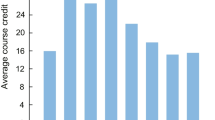Abstract
The learning early-warning is an effective way to optimize the teaching effect and teach students in accordance of their aptitude. At present, the learning early-warning faces low accuracy, high value of MSE and MAE. We propose a novel learning early-warning model: LEWM-RFA. The model divides students’ learning behaviors data into three dimensions: knowledge, behavior and attitude. Then the model uses random forest algorithm to extract features that can affect students’ grades, and then predicts students’ final exam scores. Students are divided into three warning levels according to their grades. Compared with the model based on the linear regression algorithm, the LEWM-RFA’s MSE decreases by 27.498% and the LEWM-RFA’s MAE decreases by 26.960%.
Access this chapter
Tax calculation will be finalised at checkout
Purchases are for personal use only
Similar content being viewed by others
References
Wang, L.: Design of online learning early-warning model based on big data-the learning early-warning of “research and practice column about big data in education”. Mod. Educ. Technol. 5–11 (2016)
Hua, J.: Learning Early-Warning Model: Experience from Universities in Taiwan. Jiangsu Higher Education, pp. 136–138(2007)
Breiman, L.: Random forests. Mach. Learn. 45, 5–32 (2001)
Zhang, H.: Exploration of Learning Early-warning Mechanism for Universities. Science and Technology Information, pp. 811–966 (2009)
Xu, Q., Zu, Y.: Construction and Effect of Learning Early-warning and Assistance Mechanism for Undergraduate Students in China. Science and Technology Information, pp. 547–591 (2009)
Xu, W., Yang, Y.: Construction and design of the learning early-warning system: experience from Red River College. China Education Info, pp. 94–96 (2017)
Huaining, S.: Research and design of the students study warning system model based on campus network. Sci. Mosaic 35–37 (2011)
Gu, X., Liu, Y., Hu, Y.: Linking learning analytics with instruction practices: approach to the data-enabled research to learning enhancement. Open Educ. Res. 22, 34–45 (2016)
Acknowledgements
This paper was supported by National Key R&D Program of China (Grant No. 2017YFB1402400), National Natural Science Foundation of China (Grant No. 61402020), and CERNET Innovation Project (Grant No. NGII20170501).
Author information
Authors and Affiliations
Corresponding author
Editor information
Editors and Affiliations
Rights and permissions
Copyright information
© 2018 Springer International Publishing AG, part of Springer Nature
About this paper
Cite this paper
Cheng, X. et al. (2018). A Novel Learning Early-Warning Model Based on Random Forest Algorithm. In: Nkambou, R., Azevedo, R., Vassileva, J. (eds) Intelligent Tutoring Systems. ITS 2018. Lecture Notes in Computer Science(), vol 10858. Springer, Cham. https://doi.org/10.1007/978-3-319-91464-0_32
Download citation
DOI: https://doi.org/10.1007/978-3-319-91464-0_32
Published:
Publisher Name: Springer, Cham
Print ISBN: 978-3-319-91463-3
Online ISBN: 978-3-319-91464-0
eBook Packages: Computer ScienceComputer Science (R0)




